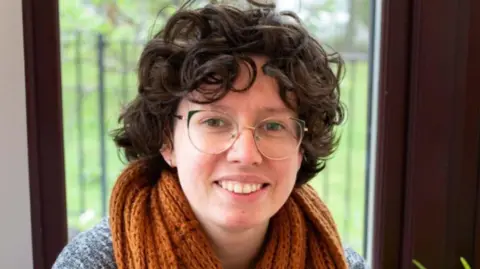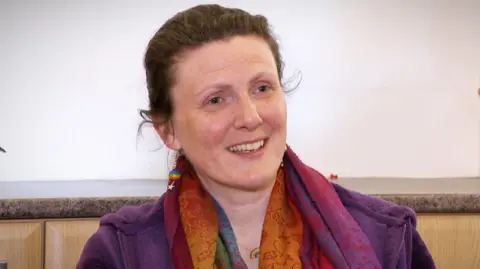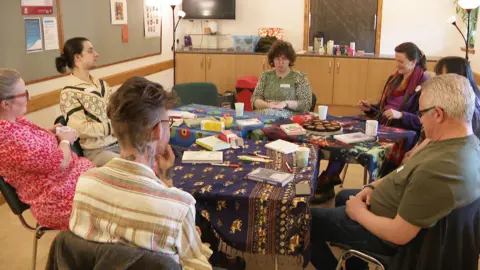'I run cafés where people talk about death - you realise it's not scary'
 Jenny Watt
Jenny WattFor Jenny Watt, death is a key part of her life.
The 31-year-old spends two or three nights a week chatting to people - whether familiar faces or strangers she's met for the first time - about everything connected with death, from working through grief to the ideal song for a funeral.
Jenny runs a handful of death cafés across Glasgow - community spaces that aim to encourage conversation and discussion about a topic few people like to raise.
BBC Scotland News attended one of the weekly gatherings, which Jenny believes can help break down taboos about the subject.
But what makes a person want to spend time talking about the end of life?
Jenny estimates around half the attendees at her groups are there to process grief in some way, whether for a recent loss or from 20 or 30 years ago.
"The same way people are called to nursing or religion, I've always been interested in death," she explains.
"It's going to happen to everybody. It might be unique for you and the relationships you are grieving but if you feel it just by yourself it can be a lonely experience.
"When you start talking about it you realise it's not so scary."
Jenny first attended a death café online during the coronavirus pandemic, and notes she wasn't looking to work through any "traumatic bereavement" - she was simply interested in the subject.
As face-to-face meetings resumed, she could not find any local groups offering discussions about grief around Glasgow.
Taking the plunge, she set up her own meeting space around two and-a-half years ago in the Battlefield area of Glasgow, panicking that no-one would turn up.
However people did - sometimes just occasionally, others more consistently - to have some tea and a slice of cake while discussing mortality and life.
'Nothing is off limits'
On the night BBC Scotland visited Jenny's café, the attendees were a mix of regulars and first timers, drawn to the meeting for various reasons.
As well as those processing grief, Jenny believes another 25% or so would be people diagnosed with a serious condition or caring for someone. The remainder tends to be people simply interested in the topic.
"Whatever people want to talk about, nothing is off limits," says Jenny.
"People laugh, they'll cry and at the end I think everyone learns something, whether that's reflecting on their own experience or suddenly realising they should get power of attorney."

That sentiment is shared by Nicola Smith, one of the more regular attendees at the Battlefield meetings.
She came along to one of the sessions the same day a close friend of hers had died, and "the tears flowed".
But letting her emotions pour out is not the only reason that Nicola keeps attending.
"It's such an intrinsic part of our life and living, and yet we don't talk about it," she told BBC Scotland.
"We don't know how to deal with it, because we don't do enough talking about it. I lost a very dear relative when my children were very small, and it was the first time my daughter had seen me cry.
"She asked me why my face was wet, and it was the time to explain it was OK to cry and this is what happens when you lose someone you love. It's not a weakness, it's not something you hush up."

Nicola added she believed the topic had become more taboo among modern generations due to the growth of hospice care since the 1960s, meaning a decrease in people dying at home.
Those trends could explain the growth in death cafés - the first in the UK was held in 2011 in London, and now there are 3,794 across the UK.
In Scotland there are dozens, from Ullapool to Kirkcudbright, but mostly clustered in cities like Glasgow and Edinburgh.
Discussion topics bounce around at the meetings, from practical advice on wills and power of attorney to more emotional reflections on personal experiences.
They form part of a wider conversation on loss and care, exemplified by May's Demystifying Death week that aims to help people support each other during traumatic experiences.
Another visitor in Jenny's group, John Mackay, wrote his PHD about death and the mourning process. He was attending his first death café in Glasgow with the intention of discussing the subject more.
"There's such a taboo about death, but you can take a lighter look at it," he says.
"The problem is that people don't talk about it. If you see funerals from other cultures it's very loud and very expressive, but in this country it's very reserved.
"You have to make sure you don't say the wrong thing and that you wear the right clothes - it would be good to loosen it up as well."
A perspective on life
Others suggest the greatest benefit of the café is more simple - in that it provides perspective on life.
Spencer Mason previously attempted to end his life, but is currently coping with the end-of-life care of a person close to him.
"I think the more we discuss death then surely the more appreciative you become of life," he says.
"In circumstances where I've become close to death, I've come out of them wanting life more than ever."
